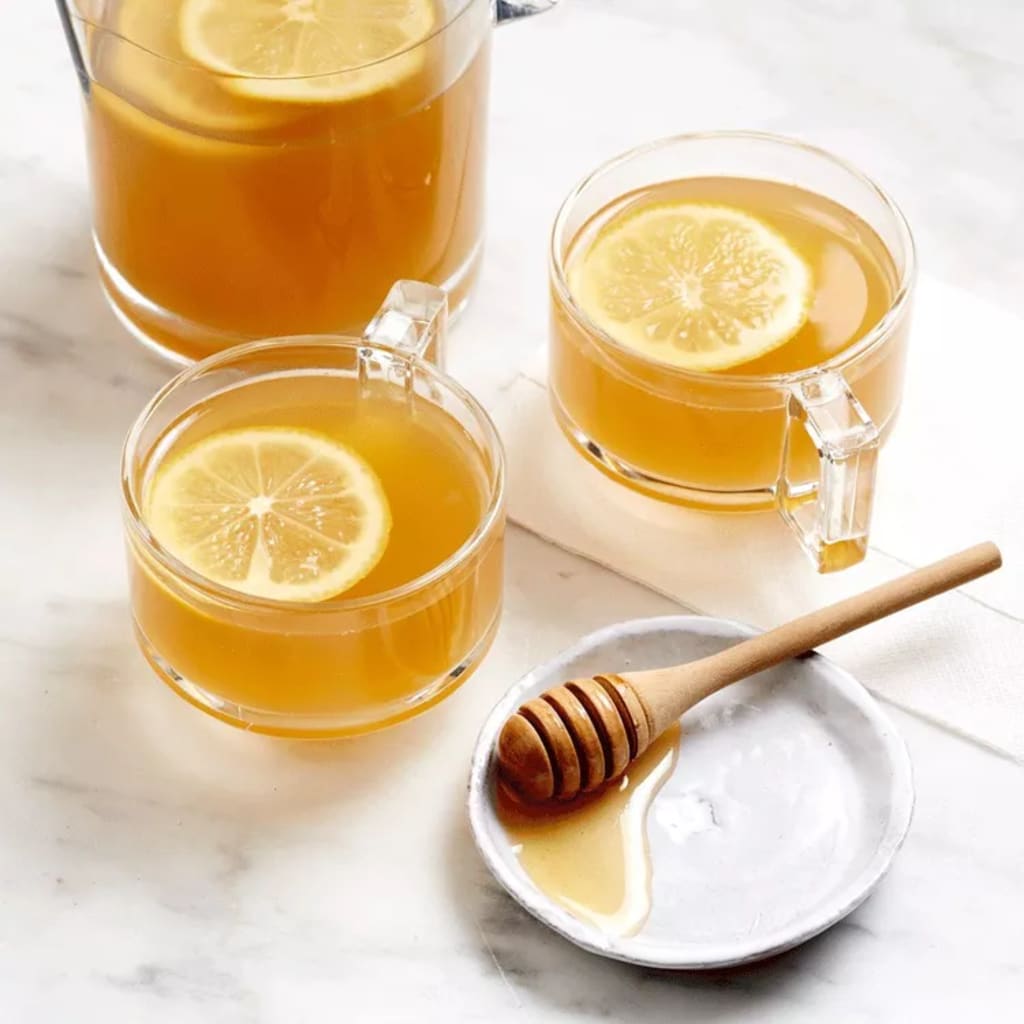The 5 Best Teas for a Sore Throat, According to Experts
Soothing a sore throat may help when battling a cold. Find out from a medical doctor and registered dietitian how to ease it using kitchen staples like tea.

Why Drink Tea If You Have a Sore Throat?
According to family medicine and culinary medicine physician, Angie Neison, M.D., CCMS, DipABLM, hydration is the biggest reason to drink tea when you have a sore throat. She says, "When you are constantly able to keep moisture in your mucous membranes, it can help lessen the pain."
Given tea is brewed with water, it's a natural way to get more fluids that you desperately need when under the weather due to the water losses from sneezing, coughing, sinus congestion and postnasal drip. Neison advises that hydration can help improve the symptoms of a viral cold or hay fever, but won't likely shorten duration by more than 24 hours.
Toby Amidor, M.S., RD, CDN, FAND, an award-winning nutrition expert and bestselling author of Up Your Veggies: Flexitarian Recipes for the Whole Family, agrees with Neison, sharing, "A warm cup of tea is always a welcome toddy for a sore throat. The warmth helps soothe the throat, while numerous teas have ingredients to help fight inflammation and fight infection."
From chamomile to green tea, there is a tea out there for everyone. Let's take a look at five popular teas to consider when you have a sore throat.
The 5 Best Teas for a Sore Throat
1. Chamomile Tea
Calming chamomile, it just has a nice ring to it. Plus, research published in Molecular Medicine Report suggests chamomile tea has medicinal properties thanks to the phytonutrients it contains that may help ease sore throat pain. Not only does this tea help lubricate your throat, Amidor shares, but it also has anti-inflammatory properties that may reduce swelling from the sore throat and potentially help with tissue health and repair. The bright side of this herbal tea is it is also caffeine-free, meaning you can sip on this any time of day.
2. Elderberry Tea
Also known as Sambucus nigra, elderberry or black elder is a popular European herbal treatment for colds and the symptoms that come with them, like sore throats. During the COVID-19 pandemic, researchers looked at the use of elderberry in commercial formulations to measure the effects it had on patients with COVID-19. The results were published in 2020 in the Advances in Integrative Medicine journal and suggest that adult participants who used elderberry for just over two weeks saw a reduction in flu-like symptoms when taken within the first 48 hours of onset.
A 2021 study published in Advances in Traditional Medicine looked at black elder, or elderberry, and found similar results to the 2020 study that elderberry helped to reduce symptoms associated with the common cold, such as fever, pain, congestion and cough. While there is limited research available on the elderflower, elderberry syrups and gummies sales soared as a result of findings like these.
To reap the proposed benefits, look for elderberry tea at your local grocer or natural-foods store and enjoy a cup as you rest and relax.
3. Green Tea
Rich in antioxidant and anti-inflammatory properties, green tea is another good option if you have a sore throat, according to Amidor. Since green tea does contain caffeine, it may not be wise to sip on this all day if you're sensitive to caffeine and want to catch some zzz's while you recover.
A 2016 study published in Anesthesiology and Pain Medicine even found that patients who had an endotracheal intubation and gargled with a green tea solution postoperatively had a reduction in pain. While more research is needed on dosing and recommendations for the common cold, this does show promise as a simple, effective treatment for a sore throat.
However, Amidor notes how you steep your green tea is important, as over-steeping can make it taste bitter. She recommends allowing the green tea bag or pouch to steep in boiling water for about three minutes total to help you get a bright and flavorful cup of green tea every time.
4. Licorice Root
While it may not be your first choice when it comes to its flavor, research has shown promise around how licorice tea may help ease the pain associated with sore throats. A 2003 excerpt published in the British Medical Journal suggested that licorice root was considered a soothing agent alongside other herbs to help ease the pain associated with a sore throat for up to 30 minutes; however, it required frequent consumption to help the pain subside.
A more recent 2019 study published in Biomedicines found that licorice root tea provided antibacterial properties that helped ease the pain associated with a sore throat. While researchers note more studies are needed to confirm these findings, it's a great step forward to support the use of complementary medicines to help people find relief from their pain.
5. Peppermint Tea
If you think this flavor of tea is reserved for the candy-cane-lined boxes during the holiday season, then think again. Peppermint has long been studied for its medicinal uses, thanks to its potential antioxidant, antimicrobial, anticancer and antiviral effects in the human body. A 2006 article in Phytotherapy Research showed that while the studies done on humans are limited, peppermint tea's antimicrobial, antiviral and antioxidant benefits are promising and should be more thoroughly researched.
The National Center for Complementary and Integrative Health, a division of the National Institutes of Health, suggests that peppermint tea appears to be safe and might actually lead to some health benefits, too. A recent 2021 review in Molecules explored all the potential benefits of the mint species, Mentha. What researchers found was similar to the 2006 findings: mint's ability to help reduce inflammation and infection caused by microbial loads in the body is strong, but the clinical trials and human studies to date are weak (or nonexistent). As science continues to evolve, we hope to see more studies on this herb, but for now, enjoy a cup of peppermint tea if you find the extract to be soothing to your throat.
Choose a Trusted Brand
Every tea (bag) is not created equal. Similar to supplements, many teas and products containing these ingredients are not regulated and aren't required to go through product testing before hitting store shelves. Brands that are not third-party tested may contain ingredients or contaminants that are not well-disclosed on the label. For this reason, look for products with third-party testing certifications that help ensure label accuracy, and always talk to your health care team before trying anything new.
When to See a Health Care Provider
According to the Centers for Disease Control and Prevention, it's important to see a physician if your sore throat symptoms include any of the following:
Difficulty breathing or swallowing
Blood in your saliva
Excessive drooling (in young children)
Joint swelling or pain
Rash
Dehydration
High fevers (that won't subside with medication)
Remember, this list is not exhaustive. If you feel your symptoms are worsening or have any concerns, seek medical attention.
Frequently Asked Questions
1. What is the best drink for a sore throat?
Hot, soothing beverages, like tea and broth, are wonderful additions to your diet while you feel under the weather. While bone broths will provide added protein since you may not have much of an appetite, Neison reminds us that herb- and spice-base broths can also provide important anti-inflammatory compounds to soothe your sore throat. But the bottom line is to stay as hydrated as you can, whether it's through tea, broth or plain water. She encourages patients to find what they enjoy and sip on it throughout the day.
2. Can tea stop a sore throat?
While tea can provide necessary hydration for an individual who has a sore throat, it cannot stop a sore throat in its entirety. Neison shares that since there is no regulation for the amount of anti-inflammatory compounds present in each tea bag, while it probably won't hurt, it won't necessarily be the cure-all patients hope for. Instead, she recommends patients focus on teas they enjoy to reap the hydration benefits tea offers.
3. How do I get rid of a sore throat quickly?
While Neison notes drinking tea may lessen the duration of a cold by up to 24 hours, its other benefits are really what contribute to feeling better while battling a sore throat. She shares, "Depending on the scale of pain, I would recommend anything from ginger tea to vegetable broth or an effective anti-inflammatory [medication] like Ibuprofen." Note, the postnasal drip from an upper respiratory cold is thick and usually what causes a sore throat. Both Neison and Amidor recommend gargling with salt water throughout the day to help dissolve the postnasal-drip mucus faster than drinking tea alone.
About the Creator
Enjoyed the story? Support the Creator.
Subscribe for free to receive all their stories in your feed. You could also pledge your support or give them a one-off tip, letting them know you appreciate their work.






Comments
There are no comments for this story
Be the first to respond and start the conversation.